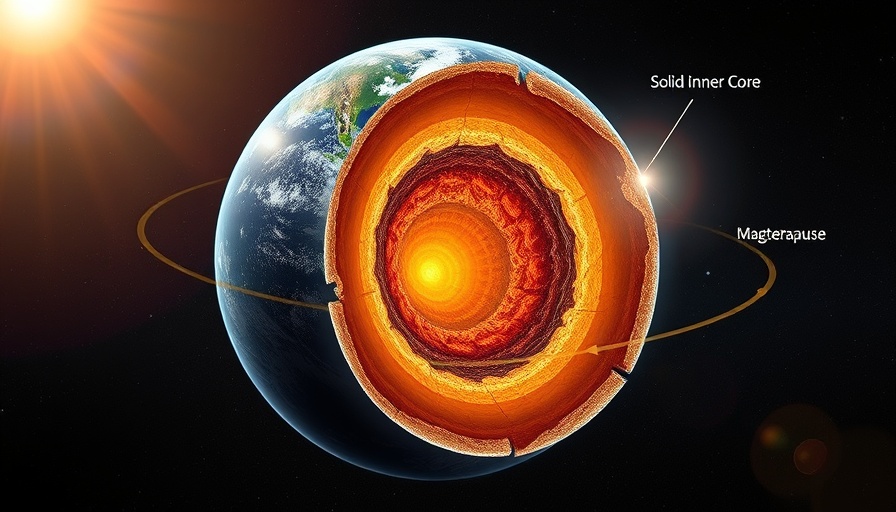
The Crucial Role of Carbon in Earth’s Inner Core
Recent research from the University of Oxford has illuminated the essential role that carbon plays in the formation and stability of Earth's inner core. This solid mass at the center of our planet, made primarily of iron, relies on the presence of carbon to maintain a balanced formation. The study reveals that about 3.8% carbon is necessary for the inner core to begin crystallization. This finding not only reshapes our understanding of planetary formation but also highlights the unique conditions that Earth's inner core required to solidify.
Why Does This Matter? Implications for Life on Earth
Understanding the chemistry of Earth's core has profound implications for how we perceive our planet and its magnetic field. The presence of carbon significantly lowers the melting point of iron, allowing the core to remain solid despite the intense heat generated from decay of radioactive elements. This stabilization of the magnetic field plays a protective role for life on Earth's surface by deflecting harmful solar and cosmic radiation. Without this protective shell, the planet could look very different today.
Debating the Formation of the Inner Core
For decades, scientists have debated the specifics surrounding how Earth's inner core crystallized. Previous theories suggested that an extreme supercooling of 800-1000°C was needed for iron to solidify, which could cause disastrous effects on Earth's magnetic field. This new insight effectively addresses why neither the core expanded to dangerous sizes nor did the magnetic field fail, as researchers now suggest a much lower supercooling of about 250°C below the melting point. Such an adjustment reshapes the narrative around Earth's geological and magnetic history.
The Geological Significance of Elemental Interactions
In addition to carbon, other elements such as silicon, sulfur, and oxygen may influence how the inner core behaves. The ability of these elements to dissolve into the molten core may explain its current properties, including why it's less dense than expected from pure iron. This revelation underscores the importance of chemical composition in geological processes, offering new pathways for understanding planetary characteristics and formation.
Why Earth Is Unique Compared to Other Planets
Earth's unique development can be partially attributed to the specific combination of elements in its core. Unlike other planetary bodies, which may lack such compositions, Earth's carbon-rich core enables a stable and protective magnetic field. This difference sets Earth apart in the realms of habitability and geological evolution.
The Future of Core Research: Next Steps
Excitingly, this research may pave the way for further studies into the internal workings of Earth and other planets. As scientists explore core compositions using advanced simulations, we may uncover more about the history of our solar system. Continued research will enable deeper insights into how metallic compounds and elemental interactions shape celestial bodies.
The Connection to Geographic and Cultural Influences in Today’s Society
In the context of Dallas and the greater Texas area, the understanding of Earth's core processes may seem distant, but the implications resonate locally. As a city characterized by technological growth and innovation, Dallas could play a role in supporting research initiatives in geology and environmental sciences, fostering a culture of knowledge that aligns with understanding our planet's complex systems. Moreover, Dallas lifestyle influencers and educational forums can engage communities in discussions about planetary science, underlining the importance of Earth's core studies.
As we become more aware of how the world around us operates at a fundamental level, it opens the door for a broader appreciation of our place in the cosmos. Through informed discussions, engaging with local experts, and raising awareness, we can foster a dialogue that not only enriches our understanding of Earth but encourages stewardship and appreciation of our delicate planet.
 Add Element
Add Element  Add Row
Add Row 



Write A Comment